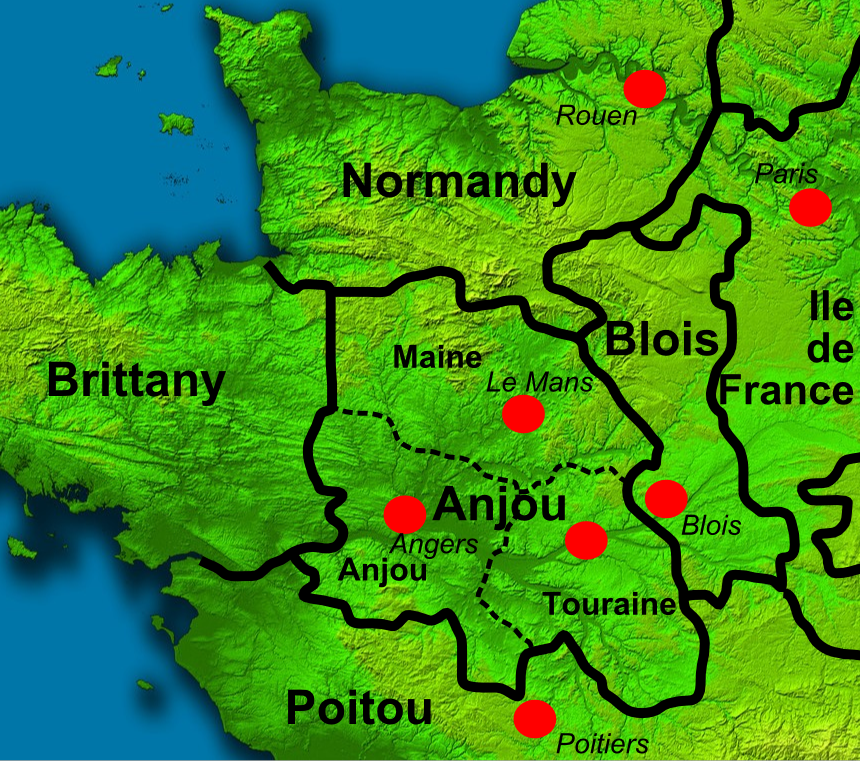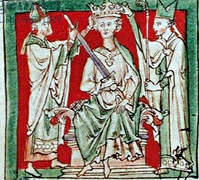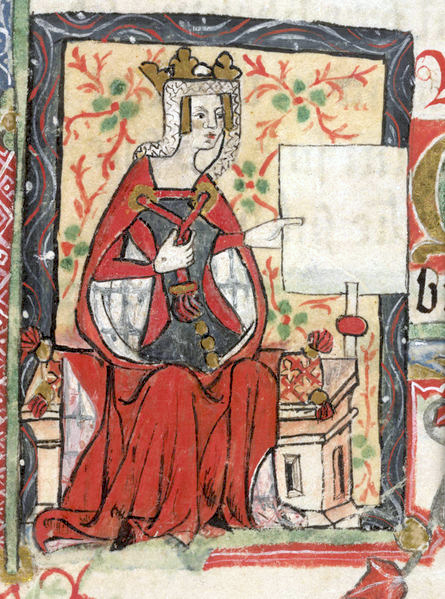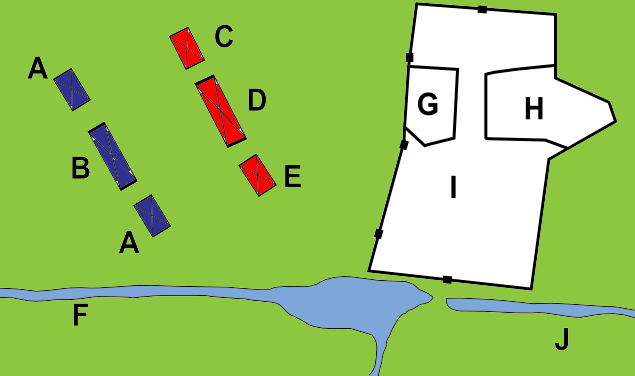|
1141
Year 1141 ( MCXLI) was a common year starting on Wednesday of the Julian calendar. Events * February 2 – The Anarchy in the Kingdom of England – Battle of Lincoln: Robert, 1st Earl of Gloucester and Empress Matilda wrest control of the throne of England from King Stephen, who is captured and imprisoned. * February 13 – Géza II is crowned King of Hungary and Croatia at age 11, succeeding his father. * May 14 – Sephardi Jewish philosopher Judah Halevi sets off from Alexandria on a pilgrimage to Palestine. * September 9 – Battle of Qatwan: Yelü Dashi, founder of the Qara Khitai, defeats the Seljuk Empire and Kara-Khanid forces. * September 14 – The Anarchy in the Kingdom of England – Rout of Winchester: Empress Matilda returns to the throne, after Robert is captured by loyalist forces. * November 1 – The Anarchy in the Kingdom of England – Robert, 1st Earl of Gloucester is exchanged by Empress Matilda for King Stephen, wh ... [...More Info...] [...Related Items...] OR: [Wikipedia] [Google] [Baidu] |
Stephen Of England
Stephen (1092 or 1096 – 25 October 1154), often referred to as Stephen of Blois, was King of England from 22 December 1135 to his death in 1154. He was Count of Boulogne '' jure uxoris'' from 1125 until 1147 and Duke of Normandy from 1135 until 1144. His reign was marked by the Anarchy, a civil war with his cousin and rival, the Empress Matilda, whose son, Henry II, succeeded Stephen as the first of the Angevin kings of England. Stephen was born in the County of Blois in central France as the fourth son of Stephen-Henry, Count of Blois, and Adela, daughter of William the Conqueror. His father died as a crusader while Stephen was still young, and he was brought up by his mother. Placed into the court of his uncle Henry I of England, Stephen rose in prominence and was granted extensive lands. He married Matilda of Boulogne, inheriting additional estates in Kent and Boulogne that made the couple one of the wealthiest in England. Stephen narrowly escaped drowning w ... [...More Info...] [...Related Items...] OR: [Wikipedia] [Google] [Baidu] |
The Anarchy
The Anarchy was a civil war in England and Duchy of Normandy, Normandy between 1138 and 1153, which resulted in a widespread breakdown in law and order. The conflict was a war of succession precipitated by the accidental death of William Adelin (the only legitimate son of Henry I of England, Henry I), who drowned in the White Ship disaster, ''White Ship'' disaster of 1120. Henry sought to be succeeded by his daughter, known as Empress Matilda, but was only partially successful in convincing the nobility to support her. On Henry's death in 1135, his nephew Stephen of Blois seized the throne with the help of Stephen's brother Henry of Blois, who was the bishop of Winchester. He was crowned as Stephen, King of England, King Stephen, and his early reign saw fierce fighting with disloyal English barons, rebellious Welsh leaders, and Scottish invaders. Following a major rebellion in the southwest of England, Matilda invaded in 1139 with the help of her half-brother Robert, 1st Earl o ... [...More Info...] [...Related Items...] OR: [Wikipedia] [Google] [Baidu] |
Empress Matilda
Empress Matilda (10 September 1167), also known as Empress Maud, was one of the claimants to the English throne during the civil war known as the Anarchy. The daughter and heir of Henry I, king of England and ruler of Normandy, she went to Germany as a child when she was married to the future Holy Roman Emperor Henry V. She travelled with the emperor to Italy in 1116, was controversially crowned empress in St Peter's Basilica, and acted as the imperial regent in Italy. Matilda and Henry V had no children, and when he died in 1125, the imperial crown was claimed by his rival Lothair of Supplinburg. Matilda's younger and only full brother, William Adelin, died in the ''White Ship'' disaster of 1120, leaving Matilda's father and realm facing a potential succession crisis. Upon her widowhood in the Holy Roman Empire, Matilda was recalled to Normandy by her father, who arranged for her to marry Geoffrey of Anjou to form an alliance to protect his southern borders in Franc ... [...More Info...] [...Related Items...] OR: [Wikipedia] [Google] [Baidu] |
Judah Halevi
Judah haLevi (also Yehuda Halevi or ha-Levi; ; ; c. 1075 – 1141) was a Sephardic Jewish poet, physician and philosopher. Halevi is considered one of the greatest Hebrew poets and is celebrated for his secular and religious poems, many of which appear in present-day liturgy. Judah haLevi was born in Tudela, in the region of Navarre, then part of Muslim Spain. Although little is known about his early life or education, it is clear that he was well-versed in Arabic, Hebrew, and classical sciences including medicine and philosophy. In his youth, he began composing Hebrew poetry, and his reputation eventually reached Moses ibn Ezra in Granada. After initial difficulties in traveling due to political shifts, haLevi was able to establish literary connections across major Jewish centers in al-Andalus. HaLevi's poetic corpus includes a wide array of genres, including panegyrics, friendship poems, wine songs, riddles, didactic verse, and wedding poems. However, he is best remembered ... [...More Info...] [...Related Items...] OR: [Wikipedia] [Google] [Baidu] |
Géza II Of Hungary
Géza II (; ; ; 113031 May 1162) was King of Hungary and Croatia from 1141 to 1162. He was the oldest son of Béla the Blind and his wife, Helena of Serbia. When his father died, Géza was still a child and he started ruling under the guardianship of his mother and her brother, Beloš. A pretender to the throne, Boris Kalamanos, who had already claimed Hungary during Béla the Blind's reign, temporarily captured Pressburg (now Bratislava in Slovakia) with the assistance of German mercenaries in early 1146. In retaliation, Géza who came of age in the same year, invaded Austria and routed Henry Jasomirgott, Margrave of Austria, in the Battle of the Fischa. Although the German–Hungarian relations remained tense, no major confrontations occurred when the German crusaders marched through Hungary in June 1147. Two months later, Louis VII of France and his crusaders arrived, along with Boris Kalamanos who attempted to take advantage of the crusade to return to Hungary. Louis V ... [...More Info...] [...Related Items...] OR: [Wikipedia] [Google] [Baidu] |
Kara-Khanid Khanate
The Kara-Khanid Khanate (; zh, t=喀喇汗國, p=Kālā Hánguó), also known as the Karakhanids, Qarakhanids, Ilek Khanids or the Afrasiabids (), was a Karluk Turkic khanate that ruled Central Asia from the 9th to the early 13th century. The dynastic names of Karakhanids and Ilek Khanids refer to royal titles with Kara Khagan being the most important Turkic title up until the end of the dynasty. The Khanate conquered Transoxiana in Central Asia and ruled it independently between 999 and 1089. Their arrival in Transoxiana signaled a definitive shift from Iranic to Turkic predominance in Central Asia, yet the Kara-khanids gradually assimilated the Perso-Arab Muslim culture, while retaining some of their native Turkic culture. The Khanate split into the Eastern and Western Khanates in the 1040s. In the late 11th century, they came under the suzerainty of the Seljuk Empire followed by the Qara Khitai (Western Liao dynasty) who defeated the Seljuks in the Battle of Qatwan in 11 ... [...More Info...] [...Related Items...] OR: [Wikipedia] [Google] [Baidu] |
Battle Of Qatwan
The Battle of Qatwan () was fought in September 1141 between the Qara Khitai (Western Liao dynasty) and the Seljuk Empire and its vassal-state the Kara-Khanid Khanate. The battle ended in a decisive defeat for the Seljuks, signaling the beginning of the end of the Great Seljuk Empire. Background The Khitans were people of the Liao dynasty who moved west from Northern China when the Jin dynasty invaded and destroyed the Liao dynasty in 1125. Liao remnants were led by Yelü Dashi who took the Eastern Karakhanid capital of Balasagun. In 1137, they defeated the Western Karakhanids, a vassal of the Seljuks, at Khujand, and the Karakhanid ruler Mahmud II appealed to his Seljuk overlord Ahmed Sanjar for protection. In 1141, Sanjar with his army arrived in Samarkand. The Kara-Khitans, who were invited by the Khwarazmians (then also a vassal of the Seljuks) to conquer the lands of the Seljuks, and also responding to an appeal to intervene by the Karluks who were involved in a conf ... [...More Info...] [...Related Items...] OR: [Wikipedia] [Google] [Baidu] |
Jin Dynasty (1115–1234)
The Jin dynasty (, ), officially known as the Great Jin (), was a Jurchen people, Jurchen-led Dynasties of China, imperial dynasty of China and empire ruled by the Wanyan clan that existed between 1115 and 1234. It is also often called the Jurchen dynasty or the Jurchen Jin after the ruling Jurchen people. At its peak, the empire extended from Outer Manchuria in the north to the Qinling–Huaihe Line in the south. The Jin dynasty emerged from Emperor Taizu of Jin, Wanyan Aguda's rebellion against the Liao dynasty (916–1125), which held sway over northern China until being driven by the nascent Jin to the Western Regions, where they would become known in Chinese historiography as the Qara Khitai, Western Liao. After conquering the Liao territory, the Jin launched a Jin–Song Wars, century-long campaign against the Song dynasty (960–1279) based in southern China, whose rulers were ethnically Han Chinese. Over the course of the Jin's rule, their emperors Sinicization, adap ... [...More Info...] [...Related Items...] OR: [Wikipedia] [Google] [Baidu] |
Rout Of Winchester
In the Rout of Winchester (14 September 1141) the army of imprisoned King Stephen of England, led by his wife, Queen Matilda of Boulogne, Stephen's brother Bishop Henry of Blois, and William of Ypres, faced the army of Stephen's cousin Empress Matilda, whose forces were commanded by her half-brother Earl Robert of Gloucester. After Empress Matilda's army besieged a castle on the edge of Winchester, Queen Matilda's army arrived and blockaded the Angevin army within the city. Cut off from supplies, the Angevin army gave up the siege, then was crushed as it began to retreat. Robert of Gloucester was captured and was subsequently exchanged for Stephen, who was returned to the throne of England. However, the civil war known as The Anarchy dragged on with neither side gaining an advantage. Background Stephen usurps the throne When William Adelin drowned in the '' White Ship'', King Henry I of England was left with no male heirs. A second marriage to 18-year-old Adeliza of Louvain ... [...More Info...] [...Related Items...] OR: [Wikipedia] [Google] [Baidu] |
Battle Of Lincoln (1141)
The Battle of Lincoln, or the First Battle of Lincoln, occurred on 2 February 1141 in Lincoln, England between King Stephen of England and forces loyal to Empress Matilda. Stephen was captured during the battle, imprisoned, and effectively deposed while Matilda ruled for a short time. Account The forces of King Stephen of England had been besieging Lincoln Castle but were themselves attacked by a relief force loyal to Empress Matilda and commanded by Robert, 1st Earl of Gloucester, Matilda's half-brother. The Angevin army consisted of the divisions of Robert's men, those of Ranulf, Earl of Chester and those disinherited by Stephen, while on the flank was a mass of Welsh troops led by Madog ap Maredudd, Lord of Powys, and Cadwaladr ap Gruffydd. Cadwaladr was the brother of Owain, King of Gwynedd, but Owain did not support any side in the Anarchy. Stephen's force included William of Ypres; Simon of Senlis; Gilbert of Hertford; William of Aumale, Alan of Richmond and Hug ... [...More Info...] [...Related Items...] OR: [Wikipedia] [Google] [Baidu] |
Robert, 1st Earl Of Gloucester
Robert FitzRoy, 1st Earl of Gloucester (c. 1090 – 31 October 1147 David Crouch, 'Robert, first earl of Gloucester (b. c. 1090, d. 1147)', Oxford Dictionary of National Biography, Oxford University Press, 2004; online edn, May 200Retrieved 1 October 2010/ref>) (''alias'' Robert Rufus, Robert de Caen ( Latinised to Robertus de Cadomo), Robert Consul) was an illegitimate son of King Henry I of England. He was the half-brother of the Empress Matilda, and her chief military supporter during the civil war known as the Anarchy, in which she vied with Stephen of Blois for the throne of England. Early life Robert was probably the eldest of Henry's many illegitimate children. He was born before his father's accession to the English throne, either during the reign of his grandfather William the Conqueror or his uncle William Rufus. He is sometimes and erroneously designated as a son of Nest, daughter of Rhys ap Tewdwr, last king of Deheubarth, although his mother has been id ... [...More Info...] [...Related Items...] OR: [Wikipedia] [Google] [Baidu] |
Seljuk Empire
The Seljuk Empire, or the Great Seljuk Empire, was a High Middle Ages, high medieval, culturally Turco-Persian tradition, Turco-Persian, Sunni Islam, Sunni Muslim empire, established and ruled by the Qiniq (tribe), Qïnïq branch of Oghuz Turks. The empire spanned a total area of from Anatolia and the Levant in the west to the Hindu Kush in the east, and from Central Asia in the north to the Persian Gulf in the south, and it spanned the time period 1037–1308, though Seljuk rule beyond the Anatolian peninsula ended in 1194. The Seljuk Empire was founded in 1037 by Tughril (990–1063) and his brother Chaghri Beg, Chaghri (989–1060), both of whom co-ruled over its territories; there are indications that the Seljuk leadership otherwise functioned as a triumvirate and thus included Seljuk dynasty, Musa Yabghu, the uncle of the aforementioned two. During the formative phase of the empire, the Seljuks first advanced from their original homelands near the Aral Sea into Greater Kho ... [...More Info...] [...Related Items...] OR: [Wikipedia] [Google] [Baidu] |








